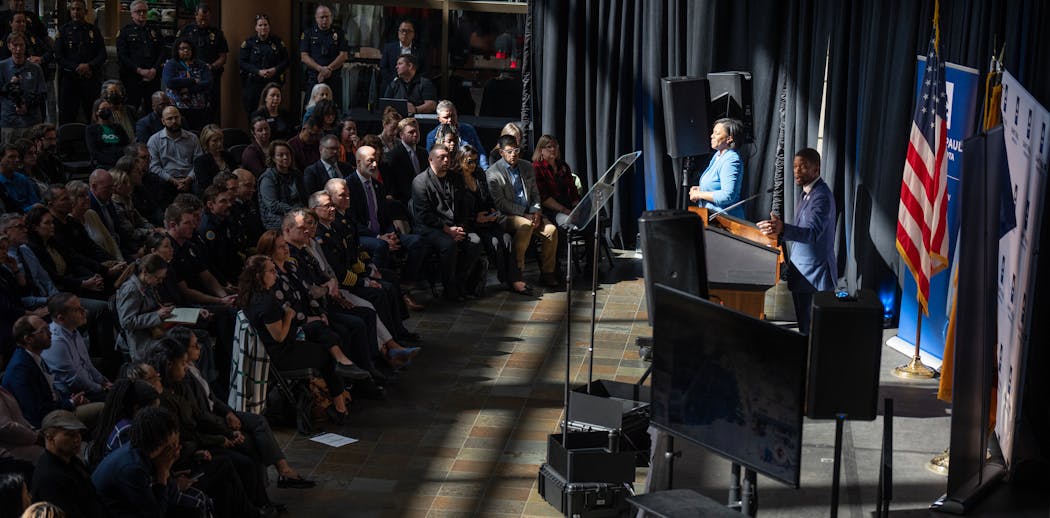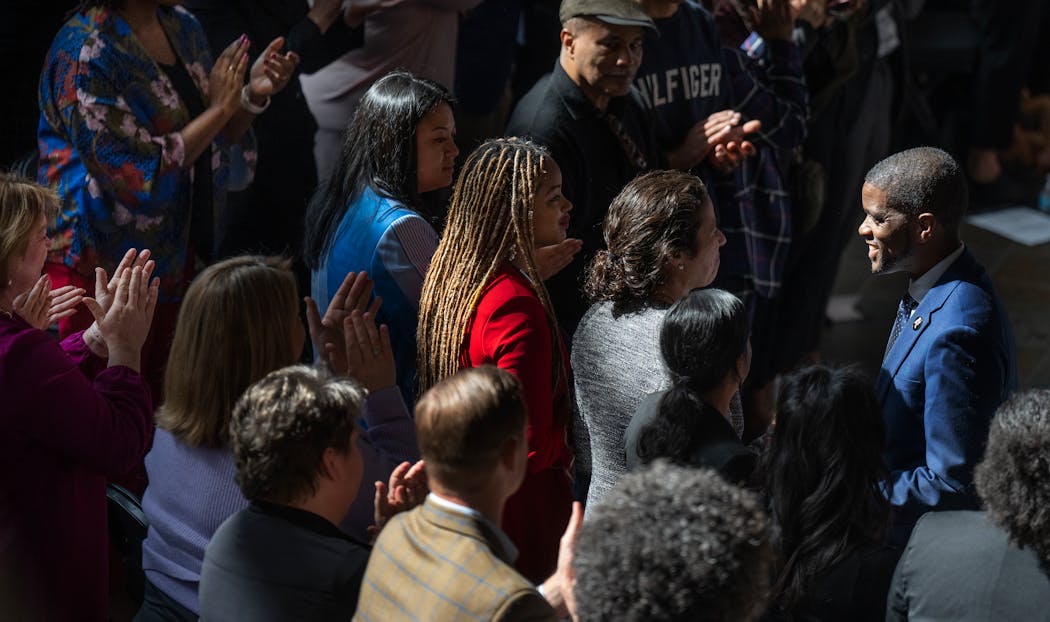St. Paul Mayor Melvin Carter used his annual State of the City address Monday to float a range of ideas for the capital city, from a new approach to snow plowing to a city-funded jobs program aimed at helping small businesses.
While the mayor's recent addresses have headlined one or two pressing issues, such as public safety and infrastructure, Carter's speech for 2024 touched on nearly a dozen topics, including some potential programs and policies that aren't yet fully fleshed out.
The mayor, who is halfway through his second four-year term, also took to the podium to highlight what he considers some of his key accomplishments ? including the recently approved 1% sales tax for streets and parks.
"We cannot improve and stay the same at the same time ? we have to choose," Carter said to a few hundred people gathered in the popcorn-scented lobby of the Xcel Energy Center. "That concept ? the choice between a new future versus an old familiar path ? was at the heart of this address last year, too."
Here are six key takeaways from the speech.
Attention to downtown
Carter's team has typically chosen strategic locations to host his address, and this year was no exception. St. Paul is asking the Legislature for $2 million for initial design work that would lead to a multi-million dollar renovation of the Xcel Energy Center.
The hockey arena's transformation is part of a larger vision for downtown that the city has been crafting with the nonprofit St. Paul Downtown Alliance.
As part of that work, Carter said the city will look to incentivize the conversion of office buildings into housing. St. Paul already hired a consultant to consider selling its City Hall Annex to a developer ? a move that would mean relocating hundreds of city workers to other parts of downtown.
Workforce development
Carter emphasized a desire to connect St. Paul workers with St. Paul jobs ? starting with those the city controls.
The mayor said St. Paul will eliminate degree requirements for 90% of city positions. When selecting contractors, the city will give extra points to those situated in St. Paul and employing St. Paul residents.
The city is also exploring a program that would help small businesses employ formerly incarcerated residents, those experiencing homelessness and other at-risk populations. The city would cover part of employees' wages for a period of time as long as small businesses agreed to retain workers after the funding runs out, taking inspiration from the federal COPS program. Carter said the city is still in the early stages of planning for the program.
Housing
Saying the city is having too many siloed conversations about housing policies, Carter announced his intention to launch "one big conversation about housing."
St. Paul will get roughly $9 million a year for housing from the new metro-area sales tax approved by the Legislature. Carter said he plans to convene open houses to engage the community to debate how to use those resources ? and about how policies, such as rent stabilization and tenant protections, should complement them.
Sales tax medallions
Carter unveiled a logo and brand for work funded by St. Paul's new 1% sales tax. The "Common Cent" projects will each be stamped with a penny-inspired insignia.
Nearly $1 billion will be raised for streets and parks over the next 20 years. Carter described the program as St. Paul's version of Depression-era Works Progress Administration.
Ash tree removal
The city removed thousands of ash trees from the public right-of-way since emerald ash borer were first discovered in the state in 2009. That multi-million operation wrapped up last year, Carter announced.
Now, the mayor said the city plans to offer low-interest or no-interest loans to property owners who can't afford to remove damaged trees, while also working on replanting on city-owned land.
The end of snow emergencies?
Next winter, St. Paul will likely pilot one-sided winter parking rules, allowing the city to plow alternate sides of the street each week.
Carter said that system could eventually replace snow emergencies in St. Paul. In an interview, he said city staff has been in discussion with Duluth officials about their parking rules. He told the crowd at Xcel to stay tuned for more details.
Minnesotans could be spending thousands each year on 'junk fees.' Some lawmakers want to ban them.
Federal charges: Aitkin County man illegally possessed guns, child porn, researched police ambushes
Day 5 of landfill search for baby allegedly drowned by mom in Bloomington hotel tub, put in dumpster




